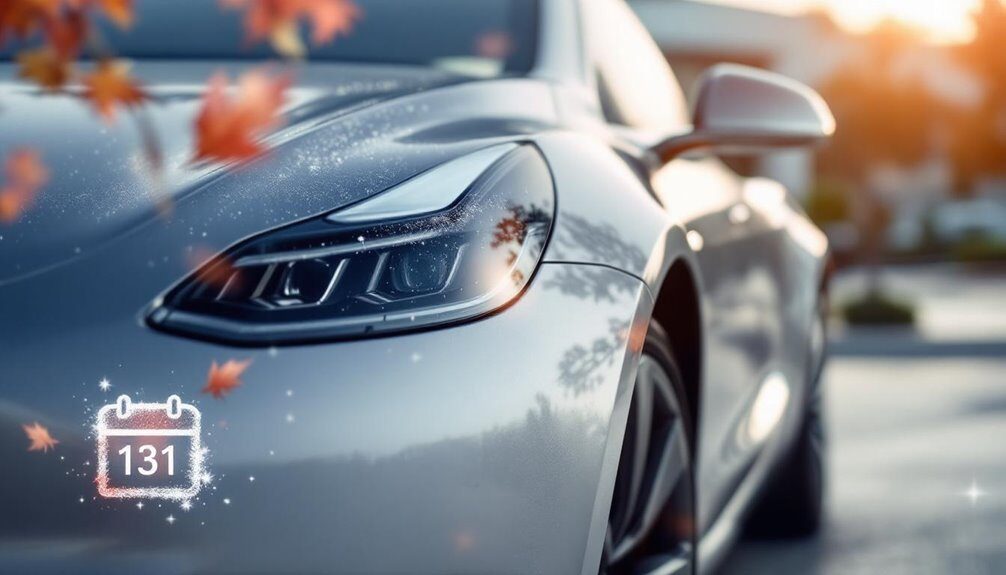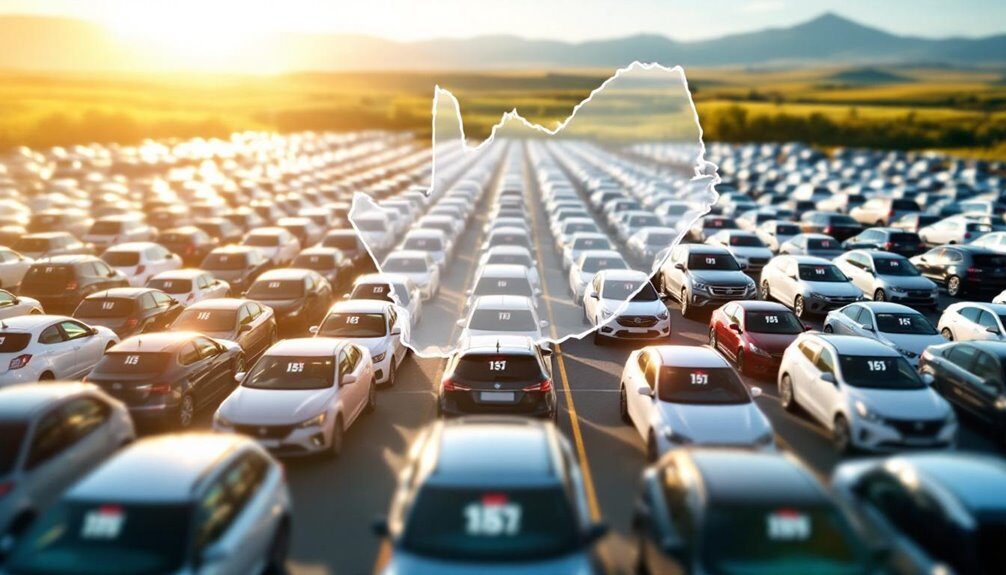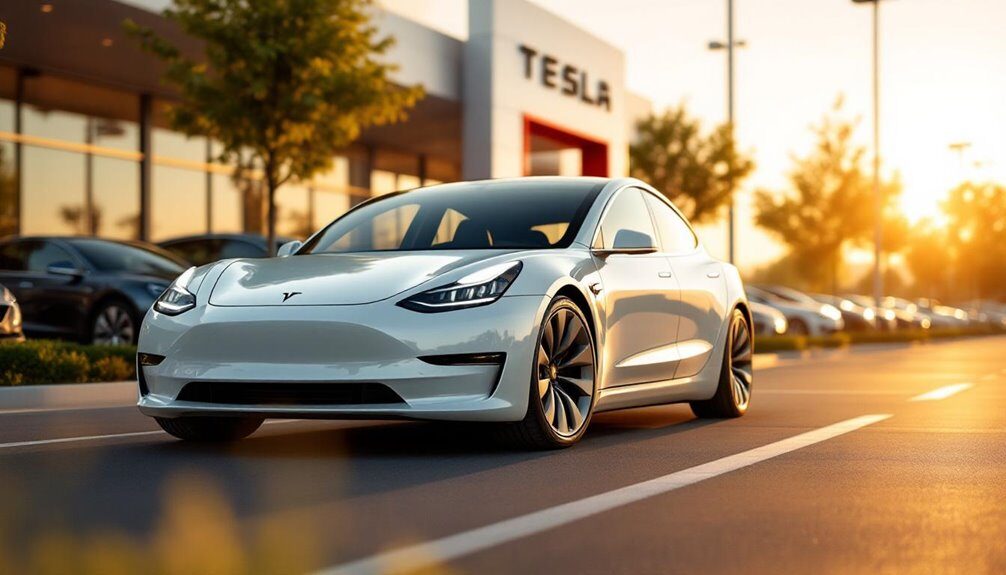You’re hunting bargains? Hit the rural provinces—Eastern Cape, Northern Cape, Free State, Mpumalanga, and Limpopo—where older, high-mileage vehicles sit cheap and dealers price to move, not impress. Cash is king in these zones; negotiation room’s abundant. Sure, Gauteng and Western Cape flaunt newer fleet stock, but you’ll pay premium rates for that privilege. Time your purchase right—December and January spike inventory clearance—and you’ll open up deals that coastal metros won’t touch. Stick around to reveal exactly where those hidden steals hide.
Western Cape: South Africa’s Most Affordable Used Car Market
If you’re hunting for a used car deal in South Africa, the Western Cape‘s got serious momentum. You’ll find prices sitting comfortably between Gauteng’s premium rates and Free State’s bargain basement.
The province is booming—population growth outpacing the national average, tourism fuelling rental fleet conversions, and interprovincial migration pumping fresh demand into the market. Translation: steady supply of quality vehicles meeting hungry buyers. The Western Cape’s rental fleet cycles through approximately 10,000 well-maintained used vehicles annually, supporting consistent market availability. The Western Cape is nearing the same shift towards SUV dominance that has already transformed Gauteng and KwaZulu-Natal. Dealerships across the country, from major urban centres to regional hubs like Paulpietersburg, are expanding their SUV and bakkie inventory to meet this growing demand. Autobahn Motors exemplifies this trend with expert technicians ensuring every vehicle meets rigorous quality standards before reaching the market.
The Volkswagen Polo dominates here for good reason—fuel efficiency, reliability, space. SUVs are climbing fast, though hatches still hold ground. Double-cab bakkies remain popular for their durability.
Competition keeps dealers sharp. Digital platforms amplify your options. You’re looking at a genuinely competitive market where affordability meets choice.
Gauteng: High Volume and Competitive Pricing Dynamics
Gauteng’s used car market doesn’t just hum along—it roars. You’re looking at South Africa’s heavyweight champion of vehicle sales, where sheer volume means serious competition and better deals for buyers like you.
Here’s what makes Gauteng tick:
- High dealer density creates cut-throat pricing battles
- Corporate fleet turnovers flood the market with near-new stock
- Online platforms expose every price tag, keeping dealers honest
- Finance infrastructure means flexible payment options everywhere
The competition’s unrelenting. Dealers jostle for your attention. You’ve got certified pre-owned vehicles, fleet cars, and private sales all vying for your wallet. With approximately 1.8 million used cars transacting annually across the country, Gauteng captures a substantial share of this activity. For buyers seeking expert guidance through this competitive landscape, automotive advice from experienced dealers can help you navigate the best options available. Whether you’re buying locally or exploring options beyond Gauteng, service appointment scheduling with reputable dealers ensures you can inspect vehicles thoroughly before making your decision.
Sure, Gauteng’s market’s massive—but that’s exactly why you win. Volume breeds competition. Competition breeds better prices. That’s not luck. That’s economics working in your favour.
Eastern Cape: Budget-Friendly Options in Lower-Demand Areas
If you’re hunting for budget-friendly used cars, the Eastern Cape‘s lower-demand areas actually work in your favour—you’ll find older models with higher mileage sitting on lots because there’s less competition driving prices up.
Rural negotiation rhythms mean cash deals happen more frequently, and sellers aren’t exactly drowning in buyer interest, which gives you real bargaining power. Regular maintenance through scheduled service plans can help extend the lifespan of these vehicles and keep them performing reliably despite their age.
You’re trading newness and low kilometres for serious price breaks, and frankly, that trade-off can be worth it if you know what you’re looking at. Before finalising any purchase, ensure the vehicle undergoes routine maintenance inspections to verify its actual condition and identify any underlying issues that could affect long-term reliability.
Lower Income Market Dynamics
When you’re hunting for a used car on a budget, the Eastern Cape’s got your back—and your wallet’ll thank you.
Here’s what drives the market:
- Lower household incomes mean dealerships stock vehicles priced to move, not impress
- Higher unemployment rates keep demand focused on practical, affordable options
- Limited finance access shifts the market towards cash buyers seeking real value
- Slower economic growth prevents aggressive price hikes that plague other provinces
You’ll find buyers aren’t chasing luxury or fancy features. They’re after reliability, fuel efficiency, and something that won’t drain their bank account.
Compact cars dominate. Older models with higher mileage are standard. The Eastern Cape’s economic reality creates genuine affordability—not marketing speak.
It’s a no-frills market where your money actually stretches.
Rural Negotiation and Cash Deals
You’re stepping into a different beast entirely when you head into Eastern Cape’s rural zones—forget the formal dealership playbook.
Here, cash is king. Sellers in low-demand areas? They’re flexible. Really flexible. Why? Fewer buyers means less competition, and that works brutally in your favour.
Cash deals move fast. Sellers avoid financing fees, credit checks, and holding costs. You pay immediately, they pocket the money. Everyone wins. No intermediaries, no commissions bleeding into the price. That’s real negotiation advantage.
Trust matters too. Local reputation shapes deals more than paperwork. Repeat buyers sometimes score extra discounts just by showing up with cash and a handshake mentality. Once you’ve secured your vehicle, prioritise a thorough brake inspection to ensure the stopping power is reliable and safe for the road ahead.
Rural Eastern Cape keeps prices low—older stock, higher mileage, but genuine room to haggle. It’s messy. It’s informal. It works. For vehicles requiring maintenance after purchase, services like tyre inspections and repairs can be sourced through established providers in neighbouring provinces to ensure roadworthiness.
Older Models and Mileage Inventory
Eastern Cape’s used car market breaks down into a gold mine of older models and high-mileage inventory that’ll hit different for budget-conscious buyers.
You’re looking at vehicles spanning 2019 to 2025, with plenty of options that won’t drain your wallet.
The mileage spreads wide—from fresh 2025 models under 5,000 km to seasoned rides pushing 70,000 km.
Here’s what you’ll actually find:
- Ford Fiesta Ecoboost (2019) at R189,995 with solid affordability
- Medium-mileage vehicles (15,000–50,000 km) hitting that sweet spot for three- to five-year-old models
- High-mileage inventory on older, cheaper models requiring mechanical diligence
- Many dealers offering warranties and quality checks on slightly aged vehicles
When purchasing higher-mileage vehicles, consider sourcing replacement parts from specialist retailers to maintain affordability during repairs. Professional engine repairs and diagnostics can help identify potential issues before they become costly problems.
Lower demand means you’ve got negotiating room.
That’s real power.
Northern Cape: Hidden Bargains for Savvy Buyers
If you’re hunting for used cars without the metropolitan price tag, the Northern Cape‘s your playground.
Here’s the thing: low sales volumes mean less competitive bidding. You’ve got actual negotiation clout—rare these days.
The market’s stuffed with older, high-mileage vehicles that appeal to budget-conscious buyers. Premium imports? Practically nonexistent here. That means fewer distractions, clearer value deals.
Limited dealer networks also mean lower overhead costs passed to you. Sure, the selection’s narrower than Gauteng’s chaos, but that’s honestly invigorating.
The Northern Cape’s rural economy keeps inflation pressures mild. You’re getting practical, durable vehicles—not luxury fantasies—at prices that won’t wreck your finances. That’s the hidden bargain right there.
KwaZulu-Natal: Moderate Pricing With Rural Opportunities
Whilst KwaZulu-Natal‘s used car market sits comfortably in the middle—neither cheap nor pricey—that’s actually where the smart money plays. You’re looking at an average of R368,500, which beats Gauteng but loses to Free State.
Here’s the real kicker: rural KZN offers genuine bargains that urban Durban can’t match.
You’ll find solid opportunities if you know where to look:
- Entry-level vehicles under R100,000 dominate rural regions, perfect for commuters and small businesses
- SUVs and double-cab pick-ups command steady demand due to agricultural needs
- Online platforms effectively serve areas with sparse dealership density
- Rural buyers prioritise durability over flash, meaning better value propositions
The province’s 12% national market share means competition keeps things honest. Rural KZN isn’t flashy. It’s practical. And that practicality translates to your wallet.
Free State: Urban and Rural Price Variations
You’re looking at two completely different markets in Free State—Bloemfontein’s urban sprawl offers hundreds of listings with newer models and certified options that’ll cost you a pretty penny, while rural towns like Frankfort are sitting on maybe five vehicles, mostly older bakkies priced between R34,000 and R42,700.
The price gap isn’t magic; it’s just basic economics—urban buyers have deeper pockets and more competition keeps dealers sharp, whereas rural sellers know their buyers can’t exactly shop around.
You’ll find urban cars better maintained and warranty-backed, but rural deals are genuinely cheaper if you’re willing to take a punt on age and mileage.
Bloemfontein’s Urban Market Dynamics
Bloemfontein’s used car market isn’t your typical sleepy provincial hub—it’s a beast of its own. You’re looking at 10–15% higher prices than rural Free State towns. Entry-level cars start around R140,000 here versus below R120,000 elsewhere. Mid-range vehicles? Expect R230,000–R350,000 in the city.
Here’s what makes Bloemfontein different:
- Dealer density drives competition — franchise dealerships, independents, and online platforms jostle for your attention with promotions and financing deals
- Better inventory turnover — faster stock rotation means newer models and lower mileage vehicles hit lots regularly
- Urban demand fuels prices — government workers, business buyers, and students create consistent market pressure
- Extended services included — warranties, maintenance packages, and virtual showrooms sweeten the deal
The city’s role as provincial capital? That attracts serious buyers with serious budgets. Your options explode here. Luxury imports, niche SUVs, demo vehicles—stuff you won’t find in rural areas. Competition’s fierce. Prices reflect it.
Rural Bargaining and Incentives
Rural Free State dealers aren’t exactly known for their generosity, but here’s the reality: limited competition means less bargaining power for you. You’re stuck. Fewer dealers, fewer vehicles, fewer options—and they know it.
That said, you’re not completely helpless. Cash deals sometimes net better discounts. Year-end sales and seasonal promotions still happen. Dealers occasionally sweeten pots with extended warranties, free servicing, or trade-in incentives to move inventory.
| Incentive Type | Availability |
|---|---|
| Extended warranties | Common |
| Free delivery | Occasional |
| Trade-in bonuses | More frequent |
| Bundled maintenance | Sometimes offered |
Price transparency? Weak. Bargaining influence? Minimal. But you’re not alone in this struggle—rural buyers across Free State face the same squeeze. Online platforms are slowly changing things, offering negotiation options that dealerships alone never would.
Mpumalanga and Limpopo: Rural Market Advantages
Whilst Gauteng and the Western Cape dominate South Africa’s used car market, Mpumalanga and Limpopo are quietly sitting on a goldmine for budget-conscious buyers.
You’re looking at real savings here. Mpumalanga’s average price hit R371,000 (June–August 2024)—a solid 10% jump from Q1, but still cheaper than the coasts. Limpopo? Even better. R385,000 average with just 5% growth. That’s slower inflation you can actually work with.
Why the advantage?
- Lower competition means dealers aren’t jacking up prices
- Fewer formalised dealerships = more negotiation room
- Rural populations prioritise practicality over prestige
- Limited financing access keeps cash deals favourable
Rural areas in both provinces lack the aggressive pricing you’ll find in major metros. Fewer certified pre-owned programmes means lower prices—though less warranty cushion.
Bottom line: you’re hunting smarter, not harder.
Popular Models and Regional Price Comparisons
When you’re hunting for a used car across South Africa’s provinces, the model you’re after matters just as much as where you’re looking. Budget hatchbacks like the Suzuki Swift command the lowest prices nationwide—perfect if you’re stretching every rand.
The Volkswagen Polo Vivo sits comfortably in mid-range territory, reliable and consistently available. Double-cab bakkies? They hold their value stubbornly.
Toyota Hilux and Ford Ranger stay pricey, especially in the Western Cape where demand runs hot. KwaZulu-Natal offers competitive rates on budget hatchbacks and emerging crossovers.
Gauteng floods the market with selection but doesn’t necessarily mean bargains. The takeaway: your province plus your model choice determines what you’ll actually pay.
Timing Your Purchase: Seasonal Trends and Best Deals
Timing matters—a lot—when you’re hunting for a used car in South Africa. Here’s the thing: you’ll find dramatically different deals depending on when you shop.
Best times to buy:
- December and January dominate with +17.2% month-on-month jumps and aggressive discounts as dealers clear inventory
- October surges with 36,042 vehicles sold, showing strong consumer confidence and competitive pricing
- Summer months (December to February) offer increased buyer activity and better negotiation power
- Avoid June and July—these winter months crater with 6.4% drops in sales activity
Winter’s brutal for deal-hunting. Fewer promotions. Less inventory turnover. Dealers aren’t desperate to move stock.
But when those summer months hit? You’re in the sweet spot. Dealers are motivated. Prices drop. Your bargaining position increases. Simple maths.



